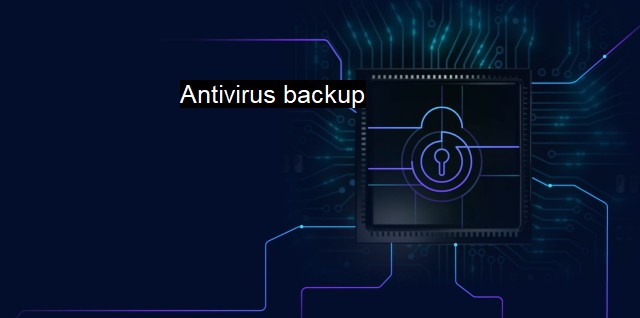What is Antivirus backup?
The Importance of Antivirus Backup for Enhanced Cybersecurity in Our Virtual World
Antivirus backup is a vital component within the area of cybersecurity offering dual capabilities of protection against malicious attacks and data recovery or loss prevention. To comprehend it in a much microscopic outlook, it is pertinent to explore each individual term 'antivirus' and 'backup' and navigating their convergence into antivirus backup.An antivirus is a software program designed to defend computers and network systems from a wide array of malware, viruses, and other cybersecurity threats that possess an impending danger. The digital realm is evolving at an unprecedented rate, encompassing novel advancements and benefits, yet simultaneously, it's opening grounds for extensive threats that are becoming increasingly intricate and damaging. Antivirus combats this potential menace, acting as the cornerstone of cybersecurity. It hunts for suspicious patterns, singular anomalous behaviors, and recognized threats to neutralize them.
In a world dominated by digitalization, any piece of data adds value. Hence, losing access to it due to arguably avoidable errors, glitches, system failures, security breaches, or disastrous virus attacks renders afflictive harm abstractly and materially. Here, the discipline of backup comes into the frame; it is the process of creating a copy of data and system configurations that can be retrieved to maintain work continuity without interruption and restore lost data when unforeseen events take place.
Bringing antivirus and backup together gives rise to antivirus backup, an integrated cybersecurity approach capturing the essence of preemptive protection and reactive recovery. It utilizes antivirus software to provide real-time defense against threats while simultaneously using backup solutions to ensure ease of data recovery. By amalgamating these two distinct yet interconnected principles, it offers a comprehensive protective apparatus reducing geometrically the area exposed to threats and potential data loss.
One of the leading advantages of configuring antivirus backup is its promulgation of substantial security. It constructs an impregnable wall of fortification by primarily preventing malware influx and, therein, inadvertently preventing data loss. Attackers may leverage various tools and tactics to infuse system-downing viruses or ransomware; antivirus counters these offensive moves while backups maintain data availability even if attacks evade the fortification, giving users a fighting chance at recovery and resilience.
An antivirus backup can save unnecessary cost and time incurred from recovering lost data subsequent to a cyberattack. It maximizes productivity as operations downtime caused by data breaches can be significantly minimized. Businesses, in particular, possess sensitive information involving the stakeholder, hence the loss may endanger survivability making antivirus backup investment practical and rewarding.
The conglomerate of antivirus and backup contribute to a strong defense mechanism, enhancing public image and stakeholder's confidence. Put it another way, users and clientele sense an aura of trust around the business or individual data holder by knowing their information is adequately secured and maintained. Trust and reputability are de facto influential in today's digital businesses hence the importance of antivirus backup in preserving both.
Having antivirus backups is a decided sine qua non in the state-of-the-art digitalized era budding with intricate threats. regularly updating both antivirus and backups is just as crucial. Cyberattacks and countermeasures are in constant evolution, hence antivirus software must be updated frequently to ensure the latest arsenals against threats. Similarly, regular backups are mandatory to prevent recent data loss since the last backup.
Antivirus backups are frankly an aegis against ever-flowing cyber threats, marking their importance as undeniable. While antivirus focuses on the fundamental aspect of threat interception and neutralization, backup bestows the power of retrieval and data continuity even in the worst scenarios. Consequently, investing effort and time in understanding and implementing antivirus backups should stand as priorities not understatements in personal and professional frames alike.

Antivirus backup FAQs
What is antivirus backup?
Antivirus backup is a software that provides protection to your system from various viruses and malware. It creates a backup of your data and makes sure that your system remains protected from possible cyber attacks.Why do I need antivirus backup?
You need antivirus backup to safeguard your data and system from possible cyber-attacks. In case your system is hacked or infected with malware, antivirus backup ensures that you have a secure backup of your data.How does antivirus backup work?
Antivirus backup works by scanning your system for viruses and malware. It then creates a backup of your data and stores it in a secure location. In case your system is hacked or infected, antivirus backup can restore your system to its previous state.Is antivirus backup important for small businesses?
Yes, antivirus backup is crucial for small businesses as they can be a prime target for cyber-attacks. Small businesses often have limited resources and may not have the expertise to deal with cyber threats. Antivirus backup ensures that your data and system are protected in case of a cyber-attack.| | A | | | B | | | C | | | D | | | E | | | F | | | G | | | H | | | I | | | J | | | K | | | L | | | M | |
| | N | | | O | | | P | | | Q | | | R | | | S | | | T | | | U | | | V | | | W | | | X | | | Y | | | Z | |
| | 1 | | | 2 | | | 3 | | | 4 | | | 7 | | | 8 | | |||||||